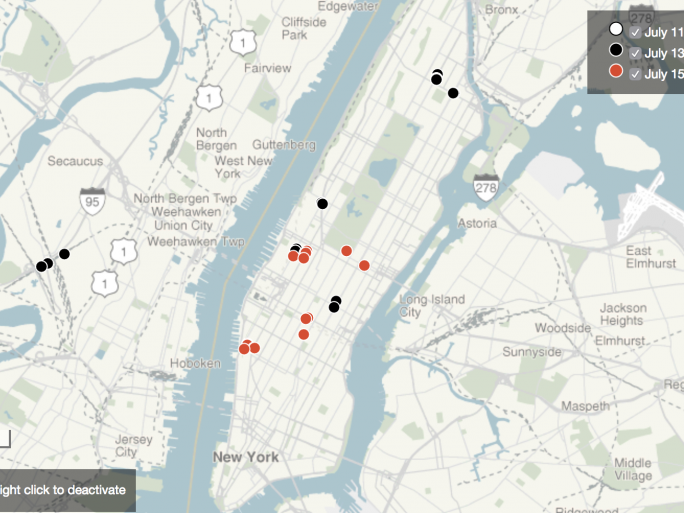Coronavirus: Google Releases Location Data To Help Authorities Check Lock-downs

Location data is being released by Google in 131 countries so officials can see if people are obeying self-isolating rules
Alphabet’s Google division has on Thursday published data for 131 countries that shows whether people are obeying self-isolating and quarantine rules.
The ‘Community Mobility Reports’ from the search engine giant showed whether visits to shops, parks and workplaces dropped in March, Reuters reported.
March is when many countries around the world brought in their lock-down rules, and readers can click here to see the Google reports on their particular country.

Community Mobility Reports
The Google data comes after surveillance firm NSO Group this week claimed it was in talks with governments around the world about using its tracking software, which is already being tested by some nation states.
Google’s analysis of location data meanwhile has come from billions of users’ phones (those phones with a Google account that has location sharing enabled).
Google said that its Community Mobility Reports “were developed to be helpful while adhering to our stringent privacy protocols and protecting people’s privacy. No personally identifiable information, such as an individual’s location, contacts or movement, will be made available at any point.”
The Google data is said to contain charts that compare traffic from 16 February to 29 March on tube, train and bus stations, as well as supermarkets and other broad categories of places.
Country breakdowns
Italy of course remains one of the hardest hit countries in the world.
According to data from the World Health Organisation (WHO), 13,915 people have died in that country, with Spain’s death toll currently sitting at 10,348 as of Thursday 3 April 2020.
The Google data shows that Italians were obeying the lock-down rules, with visits to retail and recreation locations, including restaurants and cinemas, falling 94 percent, while visits to places of work fell 63 percent.
To underline how severe the impact Coronavirus is having in Italy, even visits to supermarkets pharmacies in Italy dropped 85 percent and park visits were down by 90 percent.
Meanwhile in the United States, California, which was the first to implement a statewide lock-down, visits to retail and recreation locations were cut by half.
But the Google data also showed that visits to supermarkets surged in countries such as Singapore, and the United Kingdom.
However, it should noted that the UK only implemented its lock-down rules on the evening on 22 March.
According to the WHO data, there are now 1,018,920 cases of Coronavirus around the world, and a total of 53,292 have died from Covid-19.
According to Reuters, Facebook has also shared location data with non-governmental researchers that are producing similar reports for authorities in several countries. But the social media giant has not published any findings.
Privacy focus
Google explained the reason it is releasing this data in a blog post, and stressed it was addressing privacy concerns.
“In Google Maps, we use aggregated, anonymized data showing how busy certain types of places are – helping identify when a local business tends to be the most crowded,” Dr. Karen DeSalvo, chief health officer for Google Health and Jen Fitzpatrick, senior vice president for Google Geo, wrote in a blog post.
“We have heard from public health officials that this same type of aggregated, anonymized data could be helpful as they make critical decisions to combat Covid-19,” they wrote.
“These reports have been developed to be helpful while adhering to our stringent privacy protocols and policies,” they added. “The reports use aggregated, anonymized data to chart movement trends over time by geography, across different high-level categories of places such as retail and recreation, groceries and pharmacies, parks, transit stations, workplaces, and residential.”
They said that the insights were created with aggregated, anonymized sets of data from users who have turned on the Location History setting, which is off by default.
“Users who have Location History turned on can choose to turn the setting off at any time from their Google Account, and can always delete Location History data directly from their Timeline,” they said.
“These are unprecedented times and we will continue to evaluate these reports as we get feedback from public health officials, civil society groups, local governments and the community at large,” they concluded. “We hope these insights will add to other public health information that will help people and communities stay healthy and safe.”
Location data
Last month it was reported that European mobile operators were sharing location data with health authorities in Italy, Germany and Austria, in an effort to fight the spread of the pandemic.
Operators apparently shared data to show whether people were complying with local curbs on movement.
Days later, the British government reportedly approached at least one mobile operator regarding location data, to see if citizens were practising social isolation.
The government was said to be in talks with BT (which owns EE) over revealing mobile data to see if Brits are social distancing.
Mobile location data has been used heavily in South Korea in its fight against Coronavirus, as well as in other countries such as Israel.
Can you protect your privacy online? Take our quiz!